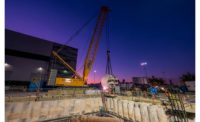Big concerts have yet to start at Las Vegas’ distinctive new ball-shaped entertainment venue, but the legal noise over its construction has been heard in Clark County courtrooms for more than two years.
Three construction-related payment lawsuits against the developer of the Sphere at the Venetian resort—by a construction manager, general contractor and steel supplier—remain unresolved as its first major event featuring rock band U2 approaches on Sept. 29.
The venue now is managed by a newly separate entity spun off in April by Madison Square Garden Entertainment Corp., Sphere Entertainment. The project budget was released as $1.66 billion, but the final cost has not been disclosed. Seating capacity is 17,500.
The legal tangles in state court in Las Vegas are complex and it is not clear if the claims or cases can or will be combined. One issue that dragged on for months in one case has been whether MSG Entertainment CEO James Dolan, whose family controls the company, must testify.
No attorneys for the parties involved returned phone calls or emails seeking comment.
But in July, attorneys representing the former project general contractor Hunt Construction Group, a unit of AECOM, filed a notice to the court describing the related cases. Pleadings filed in each lawsuit reflect what is in the notice.
From June to November 2020, Harris Rebar recorded four mechanics' liens against the Sphere, with the company claiming it still is owed $3.25 million, according to court records. AECOM-Hunt obtained lien release bonds from Liberty Mutual, but the contractor stated in its related case filing that it intends to make claims for funds against the project concrete subcontractor and MSG Entertainment.
A second lawsuit involves AECOM-Hunt, which was general contractor from June 2019 to December 2020—when it and MSG Entertainment agreed to terminate the company and assign its subcontracts to a newly formed in-house contracting entity, MSG LV Construction. AECOM-Hunt and MSG Entertainment also executed a service agreement under which AECOM-Hunt employees stayed on with MSG Entertainment to finish the work.
AECOM-Hunt portrayed the breakup in late 2020 as amicable, but the court documents, starting with the contractor complaint against MSG in February, 2022, show that things went downhill from there.
In its lawsuit, AECOM-Hunt claims MSG Entertainment breached the termination agreement and withheld funds improperly from the contractor and its subs. AECOM-Hunt claims the total damage was $19 million. In reply, MSG Entertainment claims that AECOM-Hunt breached its contract by failing to document payment applications, manage the project schedule or COVID-19 impacts and assign properly equipped personnel to the job.
Conflict Over MSG CEO Dolan's Testimony
In a third lawsuit, the most doggedly fought issue is whether MSG Entertainment CEO Dolan would testify. Many case documents and pleadings in the case have been sealed at that firm's request, but the tussle over his testimony was a major focus that dragged on over months.
Rider Levett Bucknall had been serving as a construction manager on the project and claims it is owed at least $3 million—accusing MSG Entertainment of breach of contract and dealing in bad faith.
The firm says under its contract with MSG Entertainment, signed in 2016, the company was to provide cost and estimating services. It was later expanded to include other services.
According to the firm's complaint, MSG Entertainment began reducing amounts paid on invoices submitted in March, April and May 2020 of $555,000, $538,000 and $468,000, respectively, sending it only $300,000 on each.
In a counterclaim, MSG Entertainment accused Rider Levett Bucknall of breaching its contract by failing to track and monitor costs and maintain a proper Nevada license to perform project work.
The firm first sought to depose Dolan last November, claiming his decisions had been a factor in increased project costs. MSG Entertainment argued in a March filing in support of its request to prevent a Dolan deposition, saying Rider Levett Bucknall failed to use less intrusive methods of discovery and had a "clear desire to harass Mr. Dolan rather than obtain useful information to prosecute its case." It asked the court to block the deposition by invoking what is known as the Apex Doctrine.
The legal doctrine arose to prevent the threat of depositions to encourage a settlement, according to the American Bar Association. "As a consequence, most courts require the deposition of lower-ranking employees before permitting" executive level depositions, notes the group.
But Rider Levett Bucknall attorney Lance Coburn argued that the firm had already produced much evidence through discovery and that seeking to depose Dolan was justified. The Sphere was the CEO's "pet project," said Coburn, "and he was very involved in every step of the way."
Judge Nancy Allf of Clark County District Court ruled in June that Dolan must testify, but MSG Entertainment attorneys appear from the court record to have decided to appeal that decision to Nevada's Supreme Court.






Post a comment to this article
Report Abusive Comment